Last updated: July 6, 2023
Any links on this page that lead to products on Amazon are affiliate links and I earn a commission if you make a purchase. Thanks in advance – I really appreciate it!
My grandson was curious about the little box under my truck’s dash panel. I explained to him it was the electric brake control for our horse trailer. Of course, this prompted him to ask if all horse trailers have brakes.
Most modern horse trailers have brakes. In many states, horse trailers with a gross vehicle weight of over 3,000 lbs are mandated to have brakes to travel on their roads. But smaller bumper-pull and older horse trailer models might not have brakes.
Many horse owners choose a trailer based on hitching style, color, and capacity. But a horse trailer’s braking system or lack of one should be an essential consideration when choosing a horse trailer.
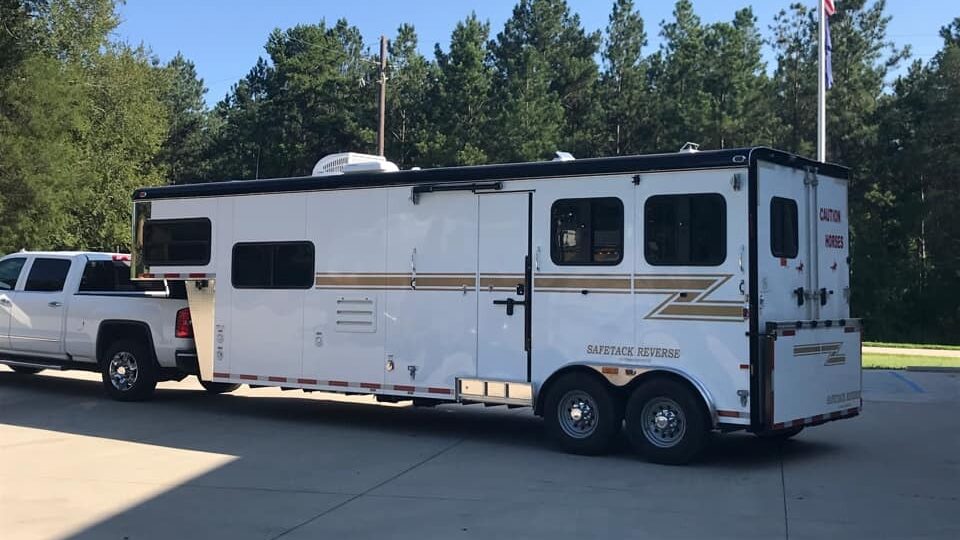
Do horse trailers have brakes?
Horse trailers make it easy to spend time riding your horse in new places. However, if you have ever transported horses, you know how difficult it can be to hook up a trailer, load your horse, pack tack, and tow the trailer.
Unless your a seasoned veteran, maneuvering when towing a trailer is not easy, and stopping can be even more difficult. The last thing you want is for your horses and gear to be slammed around in the trailer.
But you also want to protect yourself and other drivers. Towing safety is where trailer brakes enter the picture; they are the most valuable tool to protect against accidents on your horse trailer!
For safety reasons, most horse trailers these days are equipped with brakes and are legally required on heavy trailers in many states. Unless you have an old and lightweight horse trailer, the chances are that your trailer is already fitted with some brakes.
Most states require a trailer that exceeds a gross weight of 3,000 pounds to have properly functioning brakes. The weight of two average-sized horses, combined with the weight of your trailer, likely exceeds 3,000 pounds even with a lightweight trailer.
Your trailer may only have brakes at one axle for horse trailers with a gross vehicle weight of fewer than 4,000 pounds. If you tow over 4,000 pounds, you should choose a trailer with brakes on both axles.
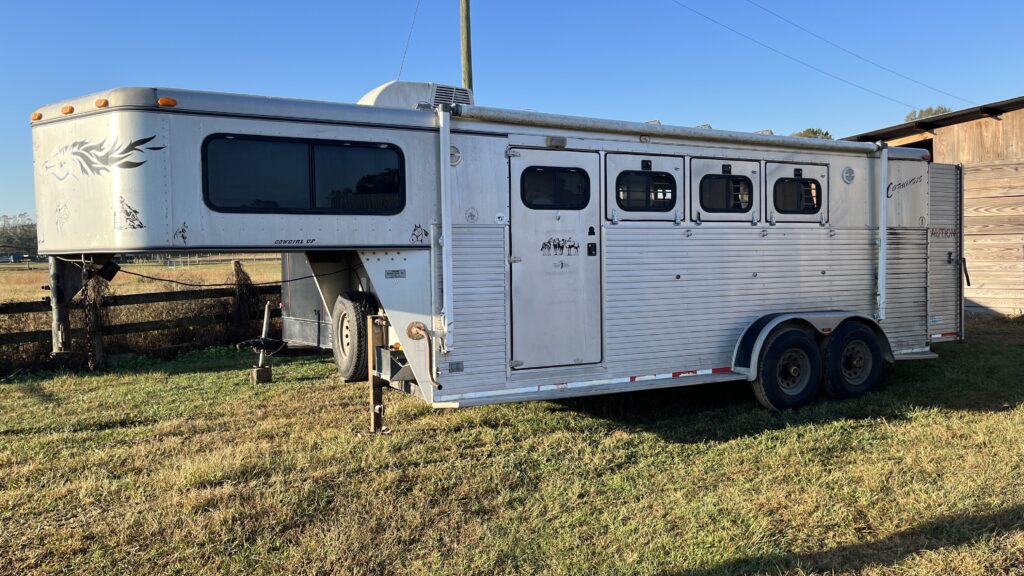
What types of brakes do horse trailers have?
Horse trailers can be equipped with two types of brakes, either hydraulic or electric. So what’s the difference between these two types of brakes? And which one is better for your trailer?
Hydraulic horse trailer brakes
Hydraulic brakes or surge brakes use impulse force for braking. In other words, when pressure is applied to the towing vehicle’s brakes, the pressure is also applied to the trailer’s brakes.
The faster you slow down with the towing vehicle, the faster the trailer will slow down as more pressure is applied to the trailer’s braking system.
However, you can’t control the brakes of your horse trailer independently. The trailer only slows down when the towing vehicle slows down, which is fine most of the time but can cause problems when backing up.
Electric brakes for your horse trailer
Electric brakes can be controlled manually from within the vehicle with a trailer brake controller inside the cab. A trailer brake controller uses electrical circuits to regulate the trailer’s braking power.
Some brake controllers automatically adjust based on the tow vehicles’ momentum, or you can change how much pressure is applied to the trailer’s brakes using the controller’s settings.
The ability to adjust the brake settings is instrumental when towing a heavy load or driving uphill. In this case, you can set the brake control to a higher level—this way, the brakes on the horse trailer take on more of the load when braking.
As a result, you maintain better control over your rig, and there is less pressure and wear on your vehicle. When going downhill and when towing light load, you can simply set the brake control to a lower setting.
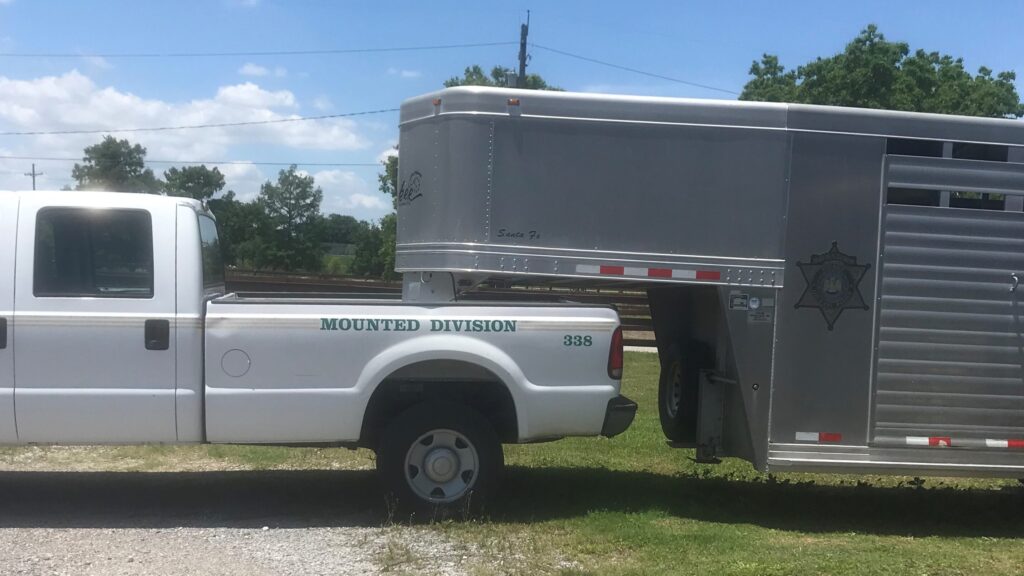
Can you tow a horse trailer with electric brakes without a controller?
It is impossible to tow a trailer with electric brakes without a controller. However, you don’t need a controller if your trailer has hydraulic brakes.
The small controller mounts in the towing vehicle; we have ours attached below the driver’s side dash. The controller placement should be easily accessible so you can activate and monitor the brakes quickly if needed.
The Difference between hydraulic and electric brakes.
In general, electric brakes are better for your vehicle. However, hydraulic brakes can provide up to two times more stopping force.
Hydraulic brakes have nearly a 50% shorter stopping distance than electric ones. But what does that mean for your horse trailer? Let’s look at an example.
If you’re traveling at 55 mph on a dry road, and you have to hit the brakes, it will take you approximately 170 feet to stop. However, the average reaction time is 0.2 to 0.3 seconds.
If you take this into account, it will take about 300 feet to come to a stop when traveling at 55 mph. Given the same speed and conditions, it will take you around 385 feet to come to a stop with electric brakes.
The following chart compares the stopping distance of electric and hydraulic brakes when traveling at 55 mph. The stopping distance is measured in feet.

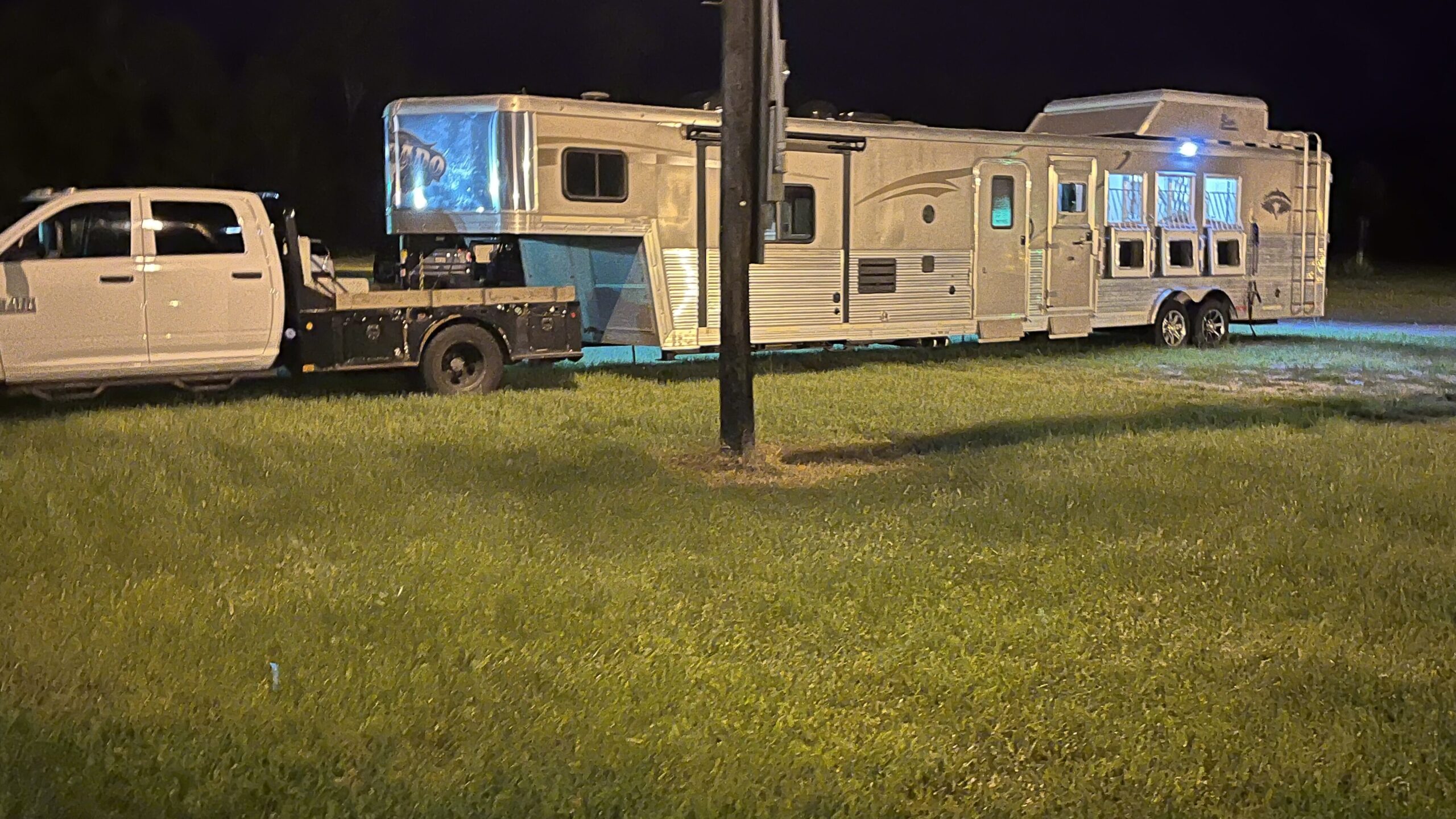
How do I know if my horse trailer has brakes?
The easiest way to find out if your horse trailer has brakes is to look at the trailer manual or ask a professional mechanic or trailer inspector. However, you can also find out for yourself.
First, take a look at the wheels. If you see brake shoes on your wheels, your trailer has brakes. That’s good news! But how do you find out what type of brakes your trailer has?
Look in the cabin of your vehicle. Can you spot a small device the size of a pack of cigarettes? If you find this little device in your vehicle, your horse trailer is equipped with electric brakes.
This device is the brake controller that allows you to control the electric brakes of your horse trailer.
If you can’t find the controller in your vehicle, your trailer probably has hydraulic brakes. Check out the tow bar to be on the safe side. Can you see a hydraulic cylinder? If so, your horse trailer has hydraulic brakes.
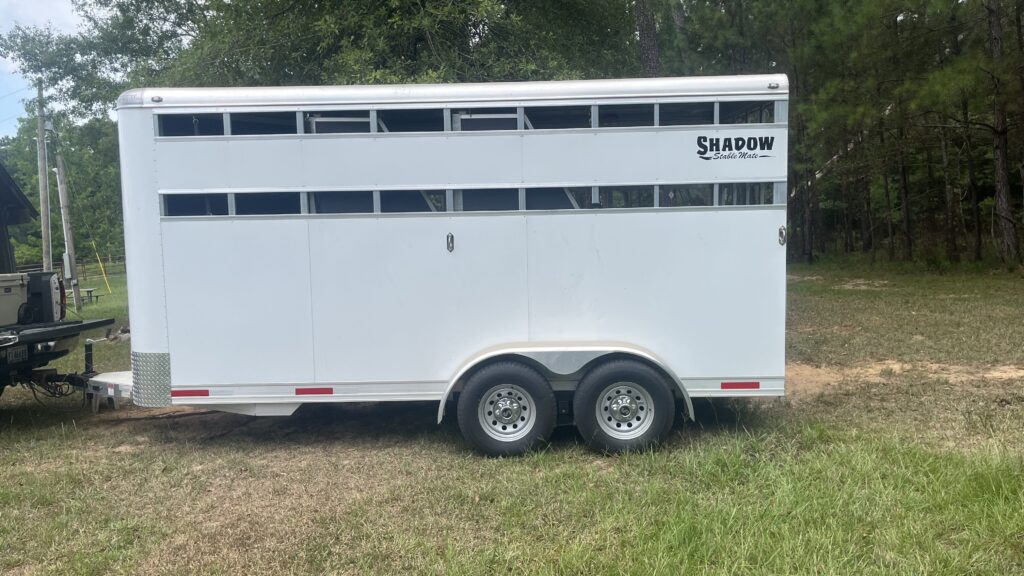
How much money does it cost to add brakes to a horse trailer?
The prices for adding brakes to your horse trailer can vary. However, depending on the type of brakes and your trailer, expect to spend between $400 and $1,200 on parts alone.
Obviously, having a mechanic add the brakes is a lot more expensive. To do it yourself requires some mechanical experience, though.
For electric braking systems, the brakes and controllers are typically sold separately. You can click on the links to check the prices of trailer brakes and electronic brake controllers on Amazon.
Adding brakes to your horse trailer yourself
The first thing you need to do is jack up your trailer. After jacking up, you will need to remove the trailer wheel and hub from the axle. If the axle does not have a square bracket, you must replace the entire axle. With the axle removed, you can now put on the brakes.
Brakes for a horse trailer can vary in price. The cost depends on the type of brakes you need on your trailer. In general, the cheaper your horse trailer, the more affordable the brakes are.
Also, hydraulic brakes are usually less expensive than electric ones. However, it is often cheaper on small older trailers to buy a used trailer with brakes than to add them.
The photo below shows the emergency braking system available on some models. A lanyard is attached to the box, and when it’s pulled, the brakes engage to stop the trailer.
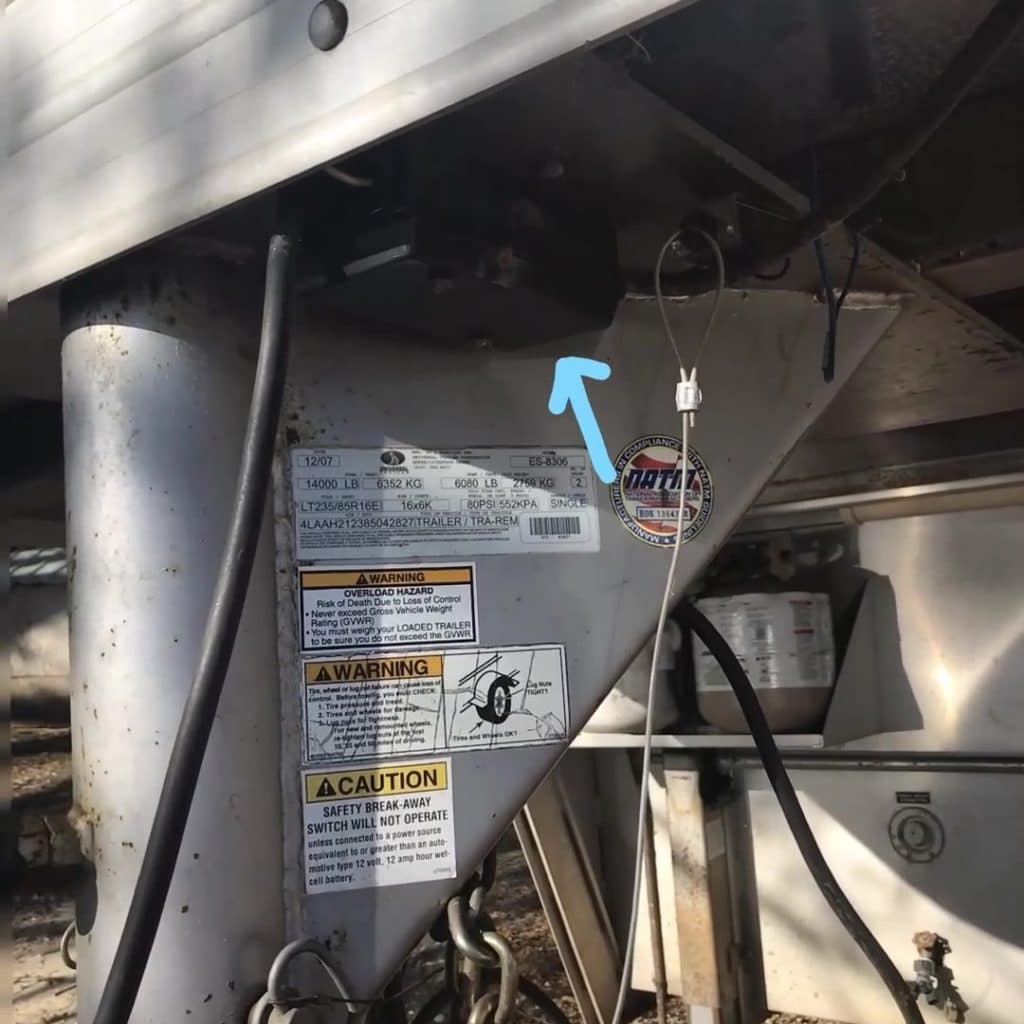
Buy a horse trailer with brakes.
Having brakes on your horse trailer increases your horses’ safety and the safety of yourself and other drivers. If you have a lightweight trailer and live in a state that doesn’t require brakes, you should still use one with brakes.
Suppose your trailer doesn’t have brakes; consider adding them. It’s not worth risking your life to save a few dollars. It doesn’t matter whether you use hydraulic or electric brakes. Both reduce the stopping distance and decrease the risk of accidents.
Related articles:
- Horse Trailers: Gooseneck or Bumper Pull Which Is Best for You?
- Towing A Two-Horse Bumper Pull Trailer: All You Need To Know
- 10 Best Bumper-Pull Horse Trailers on the Market Right Now
- Slant Load or Straight Load Two-Horse Bumper-Pull Trailer?
- What Size Are Horse Trailer Tires? 7 Essential Tire Facts.
- How Tall is a Horse Trailer? Heights of Popular Models
- 5 Horse Trailer Essentials You Need When Hauling Horses

About the Author: Miles Henry
Lifelong Horseman | Racehorse Owner | Published Author
Miles Henry brings over 25 years of hands-on experience training and owning Thoroughbred racehorses. Raised with Quarter Horses and Appaloosas, he’s spent a lifetime learning from horses—on the track, in the barn, and in the field. Today, he runs a small but successful racing stable in Louisiana and shares real-world insights on HorseRacingSense.com, helping horse owners, fans, and bettors navigate the sport with confidence.
📚 Books: View Miles’s books on Amazon »
🎧 Podcast Guest: Animal Tales Ep. 32 |
YouTube Interview
📩 Newsletter: Sign up for racing tips and horse care advice »
🔗 Follow Miles:
Twitter |
Facebook |
YouTube

